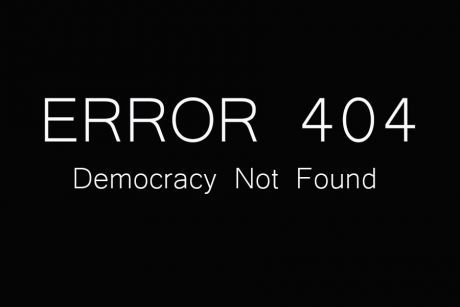Columns
You are here
Democracy on its deathbed?

December 23, 2014
There is an old saying: democracy ends at the factory gates. This sums up the fatal limitation of even the most “liberal” democracy under capitalism: workers have no control over what we make and how we make it.
Since our social labour—our ability to work collectively—is essential to our human condition, having that control hijacked by a handful of people who own capital is a pretty serious impediment to democracy. So we live in a society where we are told we are all equal, where we periodically get to choose who wields political control; yet this same society is fractured into classes, where economic power and control is concentrated in the hands of a few, the 1 %. That is a hell of a design flaw that remains festering at the heart of our democracy even at the best of times.
But these are not the best of times. Because those who own and control can never just say: “Okay, that’s enough.” They are in competition with each other in a never-ending game where nothing matters—not violence against human beings or against nature itself—except profiting.
Wealth gap
In my lifetime I have seen the gap between classes widen inexorably. In 2013, the average US CEO was paid 331 times more than the average worker. The same boss got 774 times the wage of a full-time minimum wage worker. Said CEO enjoyed a nine per cent raise from the year before. Did you get a raise last year? It wasn’t always so bad. In 1968 CEOs were paid 20 times more than workers. Have CEOs really gotten that much better since Elvis’s comeback special? So, behind the factory gate things have got much worse for us since the great social upheavals of the 1960s and 70s peaked and began to ebb.
Inevitably, as more and more economic power is concentrated in fewer hands, those hands will grab hold of more and more political power. International trade deals, court decisions giving corporate entities the same rights as individuals, political party financing shenanigans: there is a mountain of evidence detailing how the ruling elite buys control of official political machinery.
The reason I have been pondering that old saying is that Stephen Harper wants it to become obsolete. New anti-union laws are just part of his assault on our democracy. At first glance it seems like our rights and freedoms are going down the drain.
All our rights and freedoms—right to assemble and organize, right to speak and write opinions openly, right to a fair trial and presumption of innocence before the law, freedom of religious belief, equality of race, gender and sexual identity—were fought for and won, often at the cost of lives and much sacrifice and suffering. Not one was simply granted by a benevolent ruling class. To quote the great US abolitionist Frederick Douglass: “Those who profess to favor freedom, yet depreciate agitation, are men who want crops without plowing up the ground.”
Tug of war
All class societies feature a tug-of-war between those who rule and those whose work. In our capitalist society, when workers are winning the tug-of-war we get more democracy. We may even be strong enough to get a toehold of democracy in the workplace itself, through our self-organization and our unions. The ruling elite can concede that without their system falling apart.
When they are winning we see our democratic gains eroded. In my own lifetime I have witnessed: cold wars and endless hot wars; massive popular movements demanding peace, civil rights and respect for human diversity; imperialist coups overthrowing democratically elected governments; anti-imperialist struggles freeing colonies and dependent states; a US president driven from office for corruption and crimes; and, today, regimes seemingly impervious to breaking international and domestic law.
Most of my working life I have seen the slow, steady erosion of my rights and freedoms, and a decline in my economic situation. The current “war on terror” has shifted that erosion and decline into high gear.
It hasn’t all been downward. People do not take these things sitting down, and there have been magnificent struggles. Some have been victories, some merely stalemated the attack from the other side, some were inspiring even in defeat.
In my case, that experience is what helps me put the current assault on our democracy—through mass surveillance, draconian new security laws and the militarization of policing, among other things—in historical perspective.
Happy New Year of struggle
That perspective gives me hope as we head into a new year. Here’s why.
While I clearly see the continuing racism that results in the execution of young Black people by police, I also see a growing fight back. There is a new anti-racist movement growing in response to the new “Jim Crow.”
In Canada, a growing opposition to the fossil fuel industry’s hold on our economy and politics has resulted in the Harper government labeling anyone who stands up for the environment as a “terrorist.” Yes, the 11-year-old kids and senior citizens who got arrested on Burnaby Mountain to halt the Kinder-Morgan pipeline are “terrorists.”
In one sense, we are terrorists: our government is terrified of us. They launch assault after assault on First Nations because they are afraid of them. They pass laws against unions because they are afraid of them. They make it illegal to oppose pipelines because they are afraid of us all getting together in the fight against them. They buy tanks for their police forces because they fear we are coming for them.
Their fear is a reflection of our great power, if only we have the vision to see it. And it seems like more and more of us—rallying in the streets against austerity or linking arms on a mountain top—are seeing it clearly. That is what keeps me in the struggle with all of you, and that is my hope for this and every New Year.
Section:









